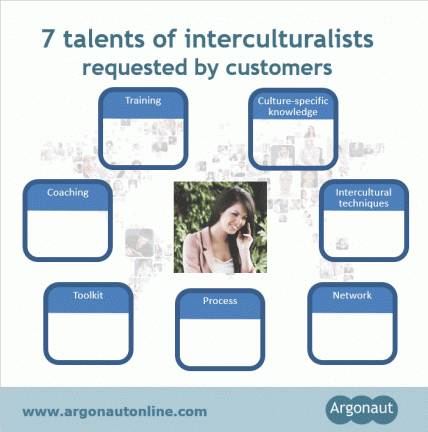We at Argonaut think that interculturalists are amazing people: knowledgeable, wise, travelled, inspirational, adaptable, professional, compassionate and businesslike.
But customers are rightly critical when investing their money and time in intercultural training. They are not looking for a good sense of humour and a pretty website. They are looking for specific talents that not all interculturalists have.
We’ve collected the seven key talents which typically play the biggest role in finding the best people to deliver intercultural training.
If you are in the field of intercultural competence and adaptation, whether giving support internally or delivering training external customers, check our list to see how you’re communicating your key talents to your customers.

Intercultural techniques
Even before culture-specific knowledge, customers are looking for people who know how to put knowledge into practice. These are the culture-general intercultural techniques which bring success, or at least survival, in any challenging cross-cultural situation, even when knowledge is low. Examples are self-awareness, curiosity, emotional strength, humour, negotiation, communication, empathy. Customers need interculturalists not only to hold these skills, but to know them, explain them, share them and build them in others.
Culture-specific knowledge
Some training demands a deep dive into a certain culture. A great interculturalist may draw the insights out of the training participants themselves. But that experience is not always available from the group. It is sometimes the role of the interculturalist to act as guide and interpreter, with native insight or experienced collaborator and resident. Customers often demand expertise based on long experience of working life in the culture.
Training
The skills of a trainer are very much in demand, so much so that a talented trainer often teams up with a culture-specific expert together to provide a great learning experience and the credibility and knowledge of a specialist in the culture. Customers look for trainers who can plan, design, manage and deliver training in a way that adapts to the needs of the participant and meets the goals of the organisation. Successful training produces more than a feel-good effect. Top interculturalists have the talent to increase the autonomy of the participant, so skills are transferred and little or no further support is needed by the end of the training process.
Coaching
While training my be extended into a full course, coaching is different. Intercultural coaching is a relationship between coach and customer. It is a special talent that Argonaut customers are increasingly requesting. The talent of a coach is based on rapid connection, forming trust, maintaining inspiration and motivation to change over longer periods, staying involved and providing time and space for dialogue identifying key challenges below surface level and pointing towards solution, even working through solutions in real time together.
Toolkit
Naturally at Argonaut, the customers we meet at looking for cross-cultural specialists using tools like CultureConnector. But there are other tools our customer expect. Interculturalists should support a variety of methodologies from diagnosis, through profiling, self-study, group work, live exercises, reporting and monitoring. Great tools extend the capabilities of independent or small-teams of interculturalists and demonstrate to customers the adaptability and professional level of the interculturalist.
Process
Customers come to us looking for a learning process at least as much as for the content of learning. While CultureConnector adapts to the widest variety of approaches by interculturalists, it can provide a foundation to lock certain milestones into place: needs analysis, startup, training events, insight and review, continual learning phase, close. There are also administrative elements which interculturalists are using CultureConnector to take care of. Customers are busy and most commonly want to outsource the housekeeping and management to a competent provider. A clear process brings efficiency, quality, measurability and ultimately impact – all decisive for customers, especially considering repeat business.
Network
When a single interculturalist cannot deliver on all aspects of a customer request, the interculturalist’s network becomes key. Many are already engaged in regional, global or language-based networks and are able to source other talents when needed. At Argonaut we see members of many networks and aim for CultureConnector to connect interculturalists as well as interculturalists. But a talent for networking is not only about professional clubs and business deals. It’s also about being able to call on old friends and colleagues to get answers to specialist questions, to get local support or to research and update culture-specific knowledge. Networking skills completes our list of talents which customers seek, but it’s a talent which can lead interculturalists to new customers and success converting the other six talents into a powerful intercultural business.
